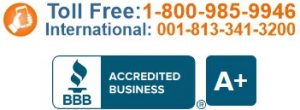Top Four Reasons to Sell Your Timeshare with Us!
Check out this short video about selling your timeshare with us! We could list dozens of reasons you should sell your vacation ownership property with the friendly and knowledgeable timeshare brokers hare at TBS, but that would make a really long video. Instead, we chose our favorites – the top four reasons to sell your timeshare here with us at Timeshare Broker Sales.
We’ve summarized below, but isn’t it always more fun to watch a video?!
- Licensed real estate agents that specialize in selling timeshares – it’s all we do, every day!
- No Upfront Fees to sell your timeshare, ever – just pay a percentage based commission at closing.
- Complete timeshare brokerage services – we’ll find qualified buyers and negotiate on your behalf: we’ve got you covered from start to finish
- BBB Accredited Business – signifies trust, reliability and honesty – we’ve never had a complaint!
Need more reasons to sell your timeshare with TBS? Follow us on Facebook, Pinterest or Twitter to catch up with us all over the web. And don’t be afraid to call for more information – there’s no question about selling your timeshare that we cant help answer. So don’t wait, contact us today at: 800-985-9946 to learn more.
How to Check a Broker’s Licensing

 We’re always advising timeshare sellers to check the licensing of a potential timeshare broker before they do business with them.
We’re always advising timeshare sellers to check the licensing of a potential timeshare broker before they do business with them.
Checking a broker’s licensing is one of the most reliable ways to ensure the reputability of a given real estate broker; but it’s come to our attention that not many people know how to check a broker’s licensing.
We’ve put together this instructive article to help consumers keep themselves safe while selling a timeshare. Read on for more information about how to verify a timeshare broker’s licensing. As vacation ownership scams continue to increase in number, it’s becoming clear that the resale of timeshares should be handled like any other real estate transaction – with the help of a licensed broker. To keep yourself safe when selling your timeshare, the first step you should take is to verify the credentials of any potential broker or real estate agent. Here’s how:
Check the Association of Real Estate License Law Officials
The first place to start your research is ARELLO® – the Association of Real Estate License Law Officials. One of the reasons consumers find it so difficult to verify licensing is that every state does things a bit differently.
ARELLO is a valuable tool because it helps encourage licensure and education recognition between jurisdictions. When you visit the ARELLO website you’ll have the option to verify licensing by either license number or the name and state in which the broker resides.
If your potential broker holds current licensing, ideally you’ll see recognition from both the National REALTORS® Database, and the state division of real estate. Bookmark both reports, and while there, take down their license number, in the “license information” section of the report.
Verify Credentials With the State
This is where things can get tricky; but if you’ve completed the first step and have a license number to search by, you shouldn’t have any problem. First, you’ll have to find the licensing authority for the particular state in which your potential broker resides.
The easiest way to do this is with a simple Google search for the [state] + “real estate licensing” authority. Because a majority of timeshare brokers live and operate in Florida, we’ll use the Sunshine State as our example.
So, to find the state licensing authority for Florida, your search might look something like this: “Florida real estate licensing”. Some states will have different terms for their real estate licensing authority like “Commission,” “Division,” or “Board.”
Because of its authority as a governmental resource on the web, the regulatory agency you’re looking for should usually show up first. From the state licensing commission, you can search by license number to learn full details like:
- Main Address/ License Location
- License Type
- License Rank
- Status (ie. Active/Not Active)
- Date License Earned
- Date License Expires
Incidentally, if you know your broker is located in Florida, you can search for licensing with the Florida Department of Business and Professional Regulation.
If you’re still unsure, pick up the phone! Call the licensing agency and ask to speak with someone in person who can help you verify the licensing. If everything checks out, you can feel confident that your potential timeshare broker is legally licensed to practice real estate in his or her state, and that any transactions they make on your behalf will be valid.
Check with the LTRBA
Recommended by the TODAY show, the Licensed Timeshare Resale Brokers Association is a group of real estate brokers who deal exclusivley with timeshares and who work hard to advocate on behalf of timeshare consumers. LTRBA members must adhere to strict membership rules that include: No Uprfront Fees, transparent and ethical resale dealings, and full-disclosure to all parties. Timeshare Broker Sales’ managing broker Don Nadeau currently serves as LTRBA membership chairman.
Bonus Points
Still, if you’re looking for brownie points; go the extra mile and check your reseller with the Better Business Bureau to find out if the broker has any complaints filed, and whether they were resolved satisfactorily. Legitimate brokers should be listed with the BBB and, better yet, BBB accredited.
Ten Signs it’s a Timeshare Scam
 Every year millions of people fall victim to scammers when trying to buy a timeshare or sell their timeshare. In fact, a recent Forbes article stated that “timeshare gripes were the fastest-growing category” of consumer complaints in 2012.
Every year millions of people fall victim to scammers when trying to buy a timeshare or sell their timeshare. In fact, a recent Forbes article stated that “timeshare gripes were the fastest-growing category” of consumer complaints in 2012.
The unfortunate truth is that timeshare scammers prey on vulnerable individuals who are often in desperate financial situations. But don’t lose hope. If you know what to look for, you can easily spot a potential timeshare scammer. If your potential reseller meets any or all of the criteria below, back away slowly.
-
They Initiated Contact – Beware of any “timeshare reseller” that initiates contact with you. Cold callers represent by far the largest single group of timeshare scammers. All told, cold-callers have stolen nearly $1 billion from innocent consumers. Most ‘cold-callers’ have gleaned your information from a list of owner’s names they purchased. Many times, cold-callers will try to convince you they’ve got a buyer already lined up or even that they’ve already sold your timeshare and just need a check to cover the closing costs. Don’t fall for it!
-
They Require for an Upfront Fee – You should never pay an upfront fee to sell your timeshare. In most cases, you should treat a timeshare like you would any other real estate transaction and work with a licensed real estate broker. Choosing a real estate broker who specializes in timeshares will help you sell your property safely and securely; with a commission paid only at the time of sale. We believe that paying an upfront fee is the number one mistake timeshare sellers make.
-
They Aren’t BBB Accredited – The BBB is a nonprofit organization focused on advancing marketplace trust. Serving as an intermediary between consumers and businesses, the BBB alerts the public to scams and handles consumer complaints. Check for BBB accreditation and don’t take a badge on the website as a sure sign. Anyone can copy and paste a logo onto their website. A legitimate time share broker will link the icon to their actual BBB rating.
-
They Don’t Have a Street Address – Most scam artists don’t want you to be able to locate them easily. After all, if you can find them easily, so can the authorities. That’s why they often only give an email address, cell phone number or a P.O. box. On the other hand, reputable companies DO want you to be able to contact them quickly and easily. They’ll offer several ways: telephone, physical address, email, fax, etc.
-
They Ask for Credit Card or Banking Information – You should never have to give credit card or bank account information to timeshare resellers upfront. A legitimate timeshare broker will will operate through a licensed closing company with secure escrow procedures.
-
Poor Grammar and Spelling Mistakes – Many times, scammers aren’t willing to invest in quality content. Sometimes, they purposely use nonsensical language to confuse consumers. Grammatical errors and spelling mistakes often indicate that the message was written by a scam artist in a foreign country. This type of nonsensical language is a common characteristic of a scam.
-
They Overuse Big, Important-Sounding Words – Scammers sometimes use official-sounding words like “national,” or “federal” or they display an official-looking seal to fool you into thinking they are legitimate. Scrutinize what you’re reading and perform a simple Google search to check the validity of their claims.
-
They Employ High Pressure Tactics – If a potential reseller acts in any way aggressive, or if he or she tries to force you into acting right away (thereby sacrificing the all-important research step), run for the hills. A legitimate company is more than happy for you to take your time researching their credibility, and will provide you with every resource available to help you do so.
-
It Sounds Too Too to Be True – Timeshare resellers may contact you with some pretty enticing claims. They might tell you they’ve got a buyer lined up to buy your timeshare, that the market in your area is “hot” and that they’re overwhelmed with buyer requests, or that they can guarantee a sale within a specific time. Be a skeptic. You can’t expect to get nearly what you paid for your timeshare from the developer. Get a free market survey to determine what your timeshare is really worth.
-
They Are Evasive or Withhold Details – Any company offering legitimate timeshare resales will provide you with all the information you need, without working to portray a false appearance of credibility; and will have verifiable references that you can contact.
So What Can You Do?
Contact the state Attorney General and local consumer protection agencies in the state where the reseller is located. Ask if any complaints are on file. You also can search online for complaints and check with the BBB.
Check the license. Ask for licensing information and verify it with the Real Estate Commission. Only deal with licensed brokers and always ask for references.
Before you sign a contract with a reseller, get the details of the terms and conditions of the contract. It should include: the services the reseller will perform; the fees, commissions, and other costs you must pay and when; and who is responsible for documenting and closing the sale.
By keeping your eyes open for the ten warning signs listed above, you can save a lot of trouble and money. If you suspect you’ve been scammed online, file a complaint with your state attorney general’s office and the Internet Crime Complaint Center (known as the IC3).
The IC3 not only collects complaints but also analyzes them, links similar complaints, and discerns patterns in order to help law enforcement identify the scammers.
Timeshare Broker Sales Owner Becomes LTRBA Membership Chairman

 We’re proud to announce that Donald Nadeau, owner and managing broker at Timeshare Broker Sales, has recently been appointed Membership Chairman of the LTRBA.
We’re proud to announce that Donald Nadeau, owner and managing broker at Timeshare Broker Sales, has recently been appointed Membership Chairman of the LTRBA.
The Licensed Timeshare Resale Brokers Association is an organization of licensed real estate professionals, who hold strong business ethics, and place the interest of the client before their own interests. Our Professional representation offers a safe and legitimate platform in which the public can rely upon to buy and sell timeshares. – LTRBA.COM
As Membership Chairman, Don will be responsible for ensuring that new and current members meet the strict membership qualifications enacted by the LTRBA for the protection of timeshare consumers.
This new appointment serves once again to underscore Timeshare Broker Sales’ commitment to creating a safe, secure secondary market for vacation ownership interests; while fostering an environment where legitimate real estate brokers may flourish.
Like-minded vacation ownership brokers interested in growing their business while helping the LTRBA police the timeshare resale industry are encouraged to contact Don Nadeau at: don@timesharebrokersales.com or fill out LTRBA’s online membership application.
“We welcome all brokers involved in interval ownership, including timeshare, fractionals, or whole ownership, that offer a traditional fee-based brokerage service of listing and selling vacation property, to apply for membership,” says Nadeau.
Buy a Timeshare for a Dollar?

 Stop by almost any timeshare forum and you’ll find discussion about purchasing a timeshare for $1 on for-sale-by-owner websites like eBay and Craigslist. These days, you’ll even find sellers advertising their property on personal Facebook pages! So what’s the deal? Why are there timeshares available for $1, and is it a good idea to buy timeshare from owners on FSBO sites?
Stop by almost any timeshare forum and you’ll find discussion about purchasing a timeshare for $1 on for-sale-by-owner websites like eBay and Craigslist. These days, you’ll even find sellers advertising their property on personal Facebook pages! So what’s the deal? Why are there timeshares available for $1, and is it a good idea to buy timeshare from owners on FSBO sites?
The primary reason you’ll find timeshares for sale at such drastic discounts (often listed for $1 – $100) is because the current owners are no longer able to afford their maintenance fees and simply want the property off their hands. Sounds great, right? Well, that depends.
The truth is, there are some great timeshares available on FSBO websites; but there are almost always strings attached. The trick is to research carefully and ask the right questions. Knowing which questions to ask comes from knowing the challenges associated with buying and selling timeshares this way. Here are a few key questions to ask FSBO owners, along with a brief explanation of why they’re important.
Is the deed paid in full? This one’s important. If the deed isn’t paid in full, you’re not getting a timeshare for $1, you’re inheriting a debt. If the amount owed is still acceptable to you as a purchase price for a timeshare – great! But, if it’s more than you were looking to pay, or if there are any penalties associated with late or missed payments, you might want to consider purchasing a timeshare whose deed is paid in full.
Are there any maintenance fees or penalties owed? This one is in line with the previous question. If the owner is selling their timeshare for $1, chances are he or she is having trouble making their maintenance fees. Find out from the seller if there are any maintenance fees or penalties for non-payment associated with the account. If there is remaining debt, who is responsible? Will the seller take care of the remaining balance, or will you inherit that deficit?
Who’s paying the closing costs? Just like traditional real-estate, when a timeshare deed is transferred from one owner to another, there are administrative costs associated with everything from document preparation to taxes. Closing costs may comprise origination fees, title search and title insurance fees, discount fees, survey fees, appraisal fees, attorney’s fees, credit report fees and prepaid expenses such as insurance and taxes. As a buyer in an FSBO transaction, it’s important to discuss who’ll be covering these costs, and how much they’ll amount to.
What is the escrow process? If you and the seller determine that you’ll be responsible for the closing costs, who will conduct your closing and where will the money be held?
Is the contract of sale valid? Finally, be sure the owner actually has the right to sell their timeshare. Ask to see their contract. In some cases, an owner is not legally entitled to conduct the sale of their timeshare property, so any contract you sign may be invalid. It’s a good idea to hire a lawyer to take a look at all associated contracts and paperwork.
The above questions might sound like a lot, but it’s extremely important to have all the facts before purchasing any kind of vacation ownership from a previous owner. If all this sounds too complicated, or if you’re looking for a way to streamline the buying process, you may want to work with a licensed timeshare broker like Timeshare Broker Sales, who can help you though every step of the process.
MSN Money offers Great Timeshare Resales Advice
We love finding good coverage of timeshare-related topics on mainstream media. We’ve recently stumbled upon some great advice at MSN Money that we’d like to make available to our website visitors.
The post, entitled: How to Buy and Sell Timeshares offers a comprehensive “overview” of timeshare resale best practices. Check it out and feel free to contact us with any questions about buying or selling vacation ownership property.
As addressed in the article, we are a licensed timeshare broker, a BBB accredited business, and we never charge an upfront fee to sell timeshare.
BBB and FTC Offer New Advice to Timeshare Sellers
Last week, the Better Business Bureau began an investigation into the legitimacy of an Iowa-based “vacation ownership closing company” going by the name of Wade Capital Management.
According to iowa.bbb.org, “the company purports to be located at 668 19th Street in Des Moines, Iowa; however, mail sent to this address has been returned as undeliverable. The address is a 7 unit apartment building. The owner of the building states that there is no business known as Wade Capital Management operating from such location.”
Unfortunately, this story sounds all too familiar. In addition to fake resale companies and upfront-fee agencies, phony closing or escrow companies are just another way that timeshare sellers can get scammed. Looking to sell your timeshare? We can’t say it enough – do your research! Want a crash course?
The BBB and the FTC offer the following advice for those wishing to sell their timeshare:
- Don’t agree to anything on the phone or online until you’ve had a chance to check out the reseller. Contact the BBB and the state Attorney General where the reseller is located.
- Ask the salesperson for all information in writing.
- Ask if the reseller’s agents are licensed to sell real estate where your timeshare is located. If so, verify it with the state Real Estate Commission. Deal only with licensed real estate brokers and agents, and ask for references from satisfied clients.
- Ask about fees and timing. It’s preferable to do business with a reseller that takes its fee after the timeshare is sold. If you must pay a fee in advance, ask about refunds. Get refund policies and promises in writing.
- Don’t assume you’ll recoup your purchase price for your timeshare, especially if you’ve owned it for less than five years and the location is less than well-known.
If you have any questions about selling your timeshare, please feel free to contact us. Timeshare Broker Sales is a licensed timeshare broker and BBB accredited business.
SOURCE: BBB Warns Consumers of Phony Timeshare Escrow Service: 04/04/12. Retrieved from: http://iowa.bbb.org/article/BBB-Warns-Consumers-of-Phony-Timeshare-Escrow-Service-33650
The Number One Mistake Timeshare Sellers Make
Selling your timeshare can be a tricky business. Unfortunately, unprepared sellers too often fall victim to timeshare scams or ineffective marketing schemes. Many sellers find themselves in difficult financial situations and, out of desperation, make rash decisions without proper research. Others simply don’t know the warning-signs. So, what’s the number one mistake timeshare sellers make, and how can you protect yourself?
Paying an upfront fee is the number one mistake timeshare sellers make. Whether a company is selling you ad-space on their “highly visible” website, or promising to close the sale for a “ready and waiting” buyer – it’s rarely worth taking the risk to pay upfront for services.
Scammers trick vulnerable sellers into cutting them checks to “close a deal” while ad-sites charge a flat fee to list your property among thousands of others – with no guarantee of sale. After all, once they’ve got your money, what’s their incentive to sell your timeshare?
So What can Timeshare Sellers Do?
Always use a licensed timeshare broker to sell your timeshare. Timeshare brokers, like other real-estate agents, don’t collect any payment until the sale is complete. Brokers work on a commission basis, meaning they’ve got true incentive to sell your timeshare. Additionally, brokers must maintain licensing to practice – ensuring a measure of reputability and transparency.
Other Timeshare Selling No-No’s
Now that you know the number one timeshare selling sin, rethink your strategy. Take the time to research carefully, and consider the following final “no-no’s” before jumping into a sale:
- Under or Overestimating your Timeshare’s Worth – Don’t know how much your timeshare is worth? Get a free market survey or contact a licensed broker to find out how much your timeshare is worth and price accordingly.
- Forgetting to Check the BBB – Not sure if a resale company is BBB Accredited? Find out what the Better Business Bureau thinks about your potential reseller, and think twice about working with a company that isn’t listed or accredited.
- Being Afraid to Ask Questions – Too many sellers don’t ask important questions – like how a broker works to sell your timeshare, or what percentage commission they’ll make off the sale. The right brokerage company will take the time to make sure you understand the whole process.
So there you have it. Don’t fall victim to the number one mistake timeshare sellers make: never pay an upfront fee to sell your timeshare. Follow these simple suggestions, and choose a licensed broker for a safe, reliable resale experience.
LTRBA Gets Today Show Shout-Out
Timeshare Broker Sales is a proud member of the Licensed Timeshare Resale Brokers Association. This morning, the Today Show recommended the LTRBA as a safe and reliable resource for selling your timeshare! Start the video at Minute 3:32 if you’re pressed for time.
http://video.today.msnbc.msn.com/today/46130614#46130614
LTRBA brokers are a trustworthy source of help for timeshare consumers. Buyers and Sellers can work with Licensed Resale Brokers who are matched to their needs. [LTRBA’s] “No Upfront Fees” policy ensures service and protects against fraud.
Always check your potential timeshare reseller against the LTRBA Member Directory. Check out our listing here!


